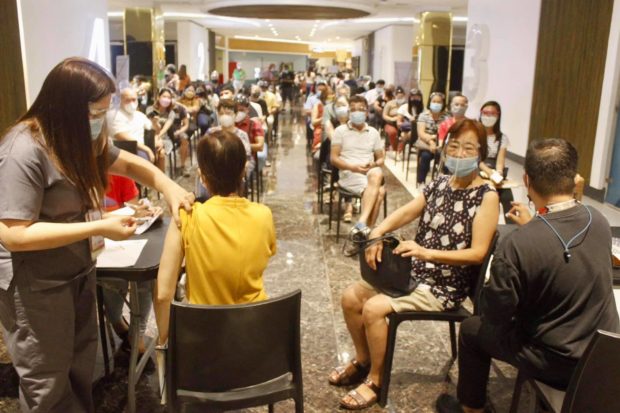Despite ‘very alarming’ surge in COVID cases, Bacolod City not keen on stricter quarantine status
MANILA, Philippines — Despite the ‘very alarming’ surge in coronavirus cases in Bacolod City, its leaders are not keen on seeking from the Interagency Task Force on Emerging Infectious Diseases (IATF) a stricter quarantine classification.
The capital city of Negros Occidental is currently under the modified general community quarantine (MGCQ), but Bacolod City Mayor Evelio Leonardia said that stricter measures are being done on their own to contain the transmission of the disease, such as longer curfew hours, liquor regulations and reduced capacity in establishments.
“We are [under] MGCQ but despite that, we made measures on our own… in an effort to contain the surge,” Leonardia said during a Laging Handa briefing on Monday.
Leonardia said that before the end of the first quarter of 2021, Bacolod City has seen a sudden surge in cases, prompting them to implement measures to curb transmission.
Among these is the signing of an executive order imposing longer curfew hours from from 10 p.m. to 4 a.m.
Article continues after this advertisement“Our story [with] COVID has been some kind of a rollercoaster ride. We started very, very slow and then we had it so bad during the months of September, October. We brought it down by December, it was only as low as five cases a day,” Leonardia said.
Article continues after this advertisement“In January, it went down to four, in February it was as little as 2 cases a day. Then all of a sudden, by the end of March, we had this surge. We are very alarmed. We, on our own, are trying to make arrangements,” he added.
The mayor also mentioned the imposition of “liquor regulations.”
“We also have very strict liquor regulations. Meaning we will only have the sale of liquor from 12nn to 6 p.m.,” he explained, adding that public drinking is “absolutely” not allowed.
Further, he said the city government appealed to religious leaders to only have a 30-percent capacity in religious spaces.
“Instead of them being allowed 50 percent here in the MGCQ period, we appealed to them to make it only 30 percent. The same goes to the restaurants and hotels. We feel that with all these, to a certain extent, will contain the virus,” he added.
Leonardia attributed the surge in COVID-19 cases to the movement of people, among others.
“This is a city of 624,000 people. Added to that, we are in a province with 2.4 million people. This is the center of trade and industry and we know that mass gatherings, social gatherings have somehow proliferated,” he said.
He added that a “certain degree of complacency” among residents and the new COVID-19 variants were also among the factors behind the rise in cases in the city.
“It is our perception that there’s a certain degree of complacency because when we have had it so good for the last five months, people tend to be more relaxed,” the mayor said.
“The people got more confident because the vaccines came, another factor we believe is the new variants,” he added.
